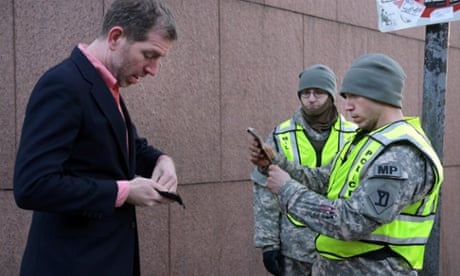Terrorist attacks offer lawmakers an ability to react. After 9/11, the American government decided to go to war in Afghanistan and to enact new laws aimed at curbing future attacks. The Patriot Act, for instance, has been regarded by some as a necessary step for safety and by others as an infringement on civil liberties.
Following the Boston Marathon attack, we've heard Republicans Lindsey Graham and John McCain, among others, push for Dzhokhar Tsarnaev to be handled in a way that many believe would be a violation of his civil liberties. So, has the Boston bombing opened up an avenue for lawmakers to pursue controversial new anti-terrorism measures that may limit civil liberties?
Almost certainly not. The latest CNN/Time/ORC poll finds that 49% of Americans are not willing to give up civil liberties in order curb terrorism, while only 40% are. In fact, 61% of Americans are more fearful that the government will overreact to the Boston bombing, compared to 31% who are worried that the government won't act strongly enough.
Other polls confirm these findings. Just after the attacks, Fox News found that 43% of Americans were willing to give up "some personal freedom" to reduce the threat of an attack, while 45% were not. A Washington Post poll, from before the bombers were caught, reported that only 41% of Americans were most worried that the government wouldn't go far enough because of constitutional concerns. Almost half of Americans, 48%, were worried the government would go too far and compromise constitutional rights.
The reaction to Boston has been monumentally different to the polling results after 9/11. Immediately following the attacks on the WTC, 66% of Americans were willing to give up "civil liberties" to stop terrorism – 26pt higher than today. And 39% of Americans were concerned that strong laws wouldn't be enacted, while 34% were more concerned about restricting civil liberties. That 4pt lead for enacting stronger laws is now a 30pt lead in favor of protecting civil liberties, per the ORC poll. After 9/11, 71% of Americans were willing to give up "personal freedom" to reduce the threat of a terrorist attack per Fox – 28pt higher than today.
Indeed, the party breakdown of new polling means that Graham and McCain have even less chance of getting their way. Democrats at large – who are unlikely to agree with hawkish senators – are now more willing to give up personal freedoms than Republicans. In the CNN/Time/ORC survey, 51% of Democrats were were willing to give up some civil liberties to curb terrorism, while only 41% of Republicans were. Fox found an identical 51% of Democrats were willing to give up "personal freedom", against just 43% of Republicans. The Washington Post poll found the same 8pt spread between Democrats and Republicans on the question of whether the government might compromise constitutional rights.
Republicans, it seems, have become the standard-bearers of civil liberties due to two factors: who's in the White House and shifting currents inside each party.
The executive branch, the government's chief, is currently a Democrat – one who many Republicans believe, for instance, is out to take their guns. After 9/11, a Republican president held office, which likely accounts for the parties switching positions. We already know that a respondent or a politician will often oppose an issue or policy just because of who's in charge.
Second, the Republican party is increasingly becoming the party of Rand Paul and civil libertarians. You would expect exactly these respondents to be against an intrusion on civil liberties. Many Paulites tend to call themselves independents, which would also explain why, in the CNN/Time/ORC and Fox News, independents were the least likely to give up personal freedoms, at 32% and 29%, respectively.
This puts hawkish Republicans like Graham and McCain in an awkward position within their own party. If there were a Republican in the White House, I think more Republicans would be willing to sacrifice civil liberties to prevent terrorism. At the same time, though, the Republican party simply is in a different place than it was a decade ago.
Overall, the chances of any major, hawkish changes in terrorist policy are significantly hampered by public opinion. Americans did not react to the Boston bombings with anything near the willingness to sacrifice civil liberties they showed after 9/11. That Republicans – usually hawkish on national security issues – are wary of giving power to the Democratic-run executive branch only further weakens the chances that any new law might pass.
